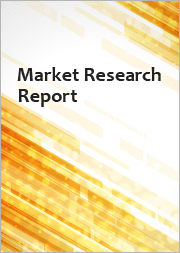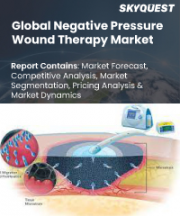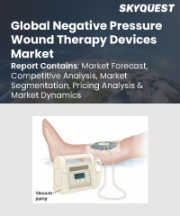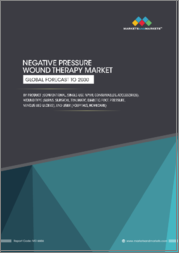
|
시장보고서
상품코드
1807543
음압 상처 치료 시장 : 제품 유형, 컴포넌트, 치료 모드, 창상 유형, 최종사용자, 유통 채널별 - 세계 예측(2025-2030년)Negative Pressure Wound Therapy Market by Product Type, Component, Therapy Mode, Wound Type, End User, Distribution Channel - Global Forecast 2025-2030 |
||||||
음압 상처 치료 시장의 2024년 시장 규모는 26억 1,000만 달러로 평가되었습니다. 2025년에 28억 달러에 이르고, CAGR 7.53%로 성장하여 2030년에는 40억 4,000만 달러에 달할 것으로 예측됩니다.
| 주요 시장 통계 | |
|---|---|
| 기준 연도 : 2024년 | 26억 1,000만 달러 |
| 추정 연도 : 2025년 | 28억 달러 |
| 예측 연도 : 2030년 | 40억 4,000만 달러 |
| CAGR(%) | 7.53% |
음압상처치료 분야는 치유 효과와 비용 절감이라는 두 가지 요구로 인해 첨단 상처 치료 관리의 매우 중요한 프런티어 분야로 부상하고 있습니다. 이 소개에서는 진공 보조 폐쇄 기술을 뒷받침하는 기본 원리를 설명하고, 제어된 대기압 이하의 환경이 어떻게 육아 형성을 촉진하고, 부종을 줄이고, 폐쇄를 가속화하는지를 설명합니다. 생체공학의 발전과 임상적 검증의 융합으로 NPWT 장치는 기존의 드레싱 재료의 용도를 넘어 급성 상처, 만성 상처, 특수 상처 치료에 필수적인 솔루션이 되었습니다.
최근 몇 년 동안 일회용 NPWT 시스템의 채택이 가속화되고 있으며, 이는 휴대성, 편리성, 오염 위험 감소로의 전환을 반영합니다. 동시에, 침투 치료 모드와 하이브리드 드레싱 재료에 대한 연구가 비약적으로 발전하여 임상의가 이용할 수 있는 치료 툴킷이 확대되었습니다. 이 개요는 기기 혁신, 규제 상황, 헬스케어 리베이트 프레임워크의 상호 관계를 인식하면서, 혁신적 변화, 무역 정책, 세분화의 복잡성, 지역적 기회, 경쟁사 벤치마킹 및 실용적인 권장 사항을 더 깊이 있게 탐구할 수 있는 토대를 마련합니다. 를 더 깊이 탐구할 수 있는 발판을 마련합니다. 이러한 요소들은 병원, 외래진료센터, 클리닉, 재택의료기관의 의사결정권자들이 전략적 투자를 할 수 있는 전체적인 스토리를 형성하고 있습니다.
기술 융합과 환자 중심 치료 모델이 음압상처치료를 재정의하고 그 임상 영역을 확장하는 방법
음압상처치료를 둘러싼 환경은 기술 융합, 환자 중심 치료 모델, 가치 기반 상환 구조로 인해 패러다임의 변화가 일어나고 있습니다. 휴대용 일회용 기기의 발전으로 NPWT에 대한 접근성이 급성기 의료 환경 외에도 확대되어 입원 기간을 단축하고 환자 1인당 비용을 절감할 수 있는 재택 치료 요법이 가능해졌습니다. 이 시스템은 통합 센서와 스마트 인터페이스를 활용하여 실시간 압력 모니터링과 원격 의료 플랫폼을 통한 원격 임상 모니터링을 가능하게 합니다. 그 결과, 의료 서비스 제공업체는 치료 프로토콜을 개인화하고, 치료 강도를 조정하고, 자주 병원을 방문하지 않고도 상처의 경과를 모니터링할 수 있습니다.
미국 관세 조정에 따른 음압창상치료제 공급망 및 가격 전략에 미치는 파급효과 확인
2025년 미국이 새로운 관세를 부과함에 따라 수입 NPWT 시스템 및 부품에 복잡한 비용 역학이 도입되어 제조업체와 유통업체는 공급망 전략을 재조정해야 합니다. 의료기기 관세로 분류되는 기기는 관세를 단계적으로 인상하고, 상륙 비용을 변경하고, 대체 조달 파트너십 협상을 촉구하고 있습니다. 이윤 압축을 완화하기 위해 여러 이해관계자들이 지역 제조 거점에 투자하고 부품 수준의 리엔지니어링을 통해 관세 분류의 최적화를 모색하고 있습니다.
제품 구성 요소 치료 모드 상처 유형 최종 사용자 및 유통 채널 세분화 인사이트별 시장 분석
세분화라는 프리즘을 통해 시장을 탐색하면 명확한 성장 촉매와 경쟁 역학이 드러납니다. 제품 유형별로 보면, 기존의 NPWT 시스템은 휴대용과 고정형으로 나뉘는데, 전자는 재택치료용으로, 후자는 병원 및 수술센터 프로토콜에 널리 사용되고 있습니다. 일회용 NPWT 유닛은 클리닉 및 외래수술센터(ASC)의 새로운 액세스 포인트를 개척하고 있습니다.
아시아태평양 및 미주 지역 음압상처치료의 지역별 보급 패턴 및 성장 요인 분석
NPWT의 채택과 성장에 대해서는 지역마다 다른 역학관계가 형성되고 있습니다. 북미와 남미에서는 탄탄한 의료 인프라와 상환 프레임워크가 첨단 NPWT 솔루션의 조기 도입을 촉진하고 있으며, 의료 서비스 제공업체들은 병상 이용률을 최적화하기 위해 재택 진료를 우선시하고 있습니다. 북미 혁신 허브는 신속한 제품 검증을 촉진하고, 의료기기 기업과 디지털 헬스 스타트업의 협업을 촉진하고 있습니다.
NPWT에 특화된 혁신가와 전략적 협업을 전개하는 세계 복합기업에 걸친 다양한 경쟁 생태계를 프로파일링합니다.
NPWT경쟁 구도에는 세계 의료기기 대기업과 전문 혁신가들이 혼재되어 있습니다. 잘 알려진 대기업들은 멀티모달 치료 제공과 데이터 분석 통합을 지원하는 모듈식 플랫폼에 투자하고 있습니다. 이들 기업은 광범위한 상업 네트워크를 활용하여 고객 유지를 강화하기 위한 교육 프로그램과 원격 서비스를 제공합니다.
다각적인 전략으로 장비 연결 강화 NPWT의 효과를 극대화하기 위해 공급망을 최적화하고 디지털 생태계를 통합합니다.
업계 리더는 NPWT의 진화를 활용하기 위해 다각적인 전략을 채택해야 합니다. 재택치료 수요 급증에 대응하기 위해 통합 연결성을 갖춘 휴대용 일회용 시스템 개발에 박차를 가해야 합니다. 원격 의료 제공업체와의 협업을 통해 원격 압력 모니터링 및 치료 조정이 가능해져 임상 결과 개선과 재입원 감소를 기대할 수 있습니다.
NPWT 시장 인사이트를 위한 정량적 분석 및 경쟁 정보별 삼각측량을 통한 1차 인터뷰 실시
당사의 조사 방법은 고위 임상 전문가, 조달 담당자, 장비 엔지니어를 대상으로 한 1차 인터뷰와 자체 병원 이용 기록의 정량적 데이터 분석을 결합하여 이루어졌습니다. 상처 관리 간호사 단체 및 규제 전문가와 함께 엄격한 검증 세션을 진행하여 조사 결과의 충실성을 확보했습니다. 시장 역학에 대해서는 업계 조사, 기업의 재무 정보 공개, NPWT 수출입 관련 세관 데이터 등을 대조하고 삼각측량(Triangle)을 반복적으로 검증했습니다.
NPWT 시장 역학의 미래를 형성하는 혁신 규제 무역과 세분화 추세의 교차점 요약 정리
이 요약은 기술 발전, 규제 변화, 세계 무역 역학의 합류점을 종합하여 NPWT 이해관계자들이 직면한 중요한 변곡점을 강조합니다. 일회용 및 휴대용 시스템이 액세스를 민주화하고, 주입 및 간헐적 치료법이 치료의 경계를 확장하고, 디지털 플랫폼이 치료 경로에 인텔리전스를 통합함에 따라 시장은 빠르게 변화할 태세를 갖추고 있습니다.
목차
제1장 서문
제2장 조사 방법
제3장 주요 요약
제4장 시장 개요
제5장 시장 역학
제6장 시장 인사이트
- Porter's Five Forces 분석
- PESTEL 분석
제7장 미국 관세의 누적 영향 2025
제8장 음압 상처 치료 시장 : 제품 유형별
- 기존 NPWT 시스템
- 휴대용 시스템
- 고정형 시스템
- 일회용 NPWT 시스템
제9장 음압 상처 치료 시장 : 컴포넌트별
- 액세서리
- 캐니스터
- 튜브
- 드레싱
- 폼
- 가제
- 하이브리드
- 펌프스
제10장 음압 상처 치료 시장 : 치료 모드별
- 지속 NPWT
- 점적 NPWT
- 소독액
- 생리식염수
- 간헐적 NPWT
제11장 음압 상처 치료 시장 : 창상 유형별
- 급성 창상
- 수술창
- 외상
- 만성 창상
- 특수 창상
- 당뇨병성 궤양
- 욕창
- 정맥성 궤양
제12장 음압 상처 치료 시장 : 최종사용자별
- 외래수술센터(ASC)
- 클리닉
- 재택 헬스케어
- 병원
제13장 음압 상처 치료 시장 : 유통 채널별
- 병원 약국
- 온라인 채널
- 소매 약국
제14장 아메리카의 음압 상처 치료 시장
- 미국
- 캐나다
- 멕시코
- 브라질
- 아르헨티나
제15장 유럽, 중동 및 아프리카의 음압 상처 치료 시장
- 영국
- 독일
- 프랑스
- 러시아
- 이탈리아
- 스페인
- 아랍에미리트(UAE)
- 사우디아라비아
- 남아프리카공화국
- 덴마크
- 네덜란드
- 카타르
- 핀란드
- 스웨덴
- 나이지리아
- 이집트
- 튀르키예
- 이스라엘
- 노르웨이
- 폴란드
- 스위스
제16장 아시아태평양의 음압 상처 치료 시장
- 중국
- 인도
- 일본
- 호주
- 한국
- 인도네시아
- 태국
- 필리핀
- 말레이시아
- 싱가포르
- 베트남
- 대만
제17장 경쟁 구도
- 시장 점유율 분석, 2024년
- FPNV 포지셔닝 매트릭스, 2024년
- 경쟁 분석
- Medela AG
- 3M Company
- ATMOS MedizinTechnik GmbH & Co. KG
- Cardinal Health
- Coloplast A/S
- ConvaTec Group PLC
- DeRoyal Industries, Inc.
- Devon Medical, Inc.
- Direct Healthcare Group
- Essity AB
- Galaxy Medical Products Inc.
- Ingersoll Rand, Inc.
- Integra LifeSciences Holdings Corporation
- Lohmann & Rauscher GmbH & Co. KG
- Molnlycke Health Care
- Pensar Medical, LLC
- Smith & Nephew PLC
- Paul Hartmann AG
- Solventum
- Stryker Corporation
- Sunmed Medical
제18장 리서치 AI
제19장 리서치 통계
제20장 리서치 컨택트
제21장 리서치 기사
제22장 부록
LSH 25.09.18The Negative Pressure Wound Therapy Market was valued at USD 2.61 billion in 2024 and is projected to grow to USD 2.80 billion in 2025, with a CAGR of 7.53%, reaching USD 4.04 billion by 2030.
| KEY MARKET STATISTICS | |
|---|---|
| Base Year [2024] | USD 2.61 billion |
| Estimated Year [2025] | USD 2.80 billion |
| Forecast Year [2030] | USD 4.04 billion |
| CAGR (%) | 7.53% |
The negative pressure wound therapy sector has emerged as a pivotal frontier in advanced wound care management, driven by the dual imperatives of healing efficacy and cost containment. This introduction demystifies the fundamental principles that underpin vacuum-assisted closure techniques, illustrating how controlled sub-atmospheric pressure environments enhance granulation, reduce edema, and expedite closure. Through a confluence of biomedical engineering advances and clinical validations, NPWT devices have transcended traditional dressing applications to become essential solutions across acute, chronic, and specialty wound care.
Over recent years, the adoption of single-use NPWT systems has accelerated, reflecting a shift toward portability, convenience, and reduced contamination risk. Simultaneously, research breakthroughs in instillation therapy modes and hybrid dressing materials have expanded the therapeutic toolkit available to clinicians. Acknowledging the interplay between device innovation, regulatory landscapes, and healthcare reimbursement frameworks, this overview sets the stage for a deeper exploration of transformative shifts, trade policies, segmentation intricacies, regional opportunities, competitive benchmarks, and actionable recommendations. Together, these elements form a holistic narrative that will guide decision-makers in hospitals, ambulatory centers, clinics, and home health providers toward strategic investments.
How Technological Convergence and Patient Centric Care Models Are Redefining Negative Pressure Wound Therapy and Expanding Its Clinical Footprint
The landscape of negative pressure wound therapy is undergoing a paradigm shift fueled by technological convergence, patient-centric care models, and value-based reimbursement structures. Advances in portable, single-use devices have broadened access to NPWT beyond acute care settings, enabling home-based therapy regimens that reduce hospital stays and lower per-patient costs. These systems leverage integrated sensors and smart interfaces, allowing real-time pressure monitoring and remote clinical oversight through telehealth platforms. As a result, healthcare providers can personalize treatment protocols, adjust therapy intensity, and monitor wound progress without frequent clinic visits.
Moreover, the emergence of instillation NPWT, combining negative pressure with intermittent delivery of antimicrobial or physiologic solutions, represents a significant leap in wound bioburden control. Hybrid dressings that fuse foam and gauze substrates enhance exudate management while accommodating complex wound geometries. Concurrently, expanded regulatory pathways for digital health solutions encourage the integration of NPWT into comprehensive chronic wound management programs. These transformative shifts underscore the evolving role of NPWT from a standalone modality to a core component of multidisciplinary, patient-centric care ecosystems.
Examining the Ripple Effects of US Tariff Adjustments on Negative Pressure Wound Therapy Supply Chains and Pricing Strategies
The imposition of new United States tariffs in 2025 has introduced complex cost dynamics for imported NPWT systems and components, compelling manufacturers and distributors to recalibrate supply chain strategies. Devices categorized under medical equipment tariffs have seen incremental duty increases, altering landed costs and prompting negotiations for alternative sourcing partnerships. To mitigate margin compression, several stakeholders are investing in regional manufacturing nodes and exploring tariff classification optimizations through component-level reengineering.
These trade policy changes coincide with heightened regulatory scrutiny on supply chain resilience in the wake of global disruptions. Clinical providers and procurement departments are increasingly scrutinizing total cost of ownership, factoring in duties, freight, and customs clearance fees. In response, industry-leading device makers are diversifying production footprints across the Americas and Asia-Pacific regions, while leveraging free trade agreements to preserve competitive pricing. The cumulative impact of these tariffs underscores the importance of agile operations, strategic inventory buffering, and collaborative procurement frameworks that can absorb fiscal pressures without compromising patient care.
Unlocking Market Nuances Through Product Component Therapy Mode Wound Type End User and Distribution Channel Segmentation Insights
Navigating the market through a segmentation prism reveals distinct growth catalysts and competitive dynamics. On the cornerstone of product type, conventional NPWT systems bifurcate into portable and stationary configurations, with the former gaining traction for home healthcare applications and the latter remaining entrenched in hospital and surgical center protocols. Single-use NPWT units are unlocking new access points in clinics and ambulatory surgical centers, driven by simplicity and disposability.
Component segmentation highlights the ascendancy of advanced dressings in foam, gauze, and hybrid formulations, while accessories such as canisters and tubing continue to evolve toward ergonomic designs and antireflux features. Pump innovations focus on energy efficiency, noise reduction, and integrated alarms. Therapy mode analysis underscores the proliferation of continuous NPWT in straightforward wound cases, while instillation NPWT with antiseptic or normal saline solutions is proving transformative in complex wound bioburden management. Intermittent therapy retains relevance for wounds requiring cyclic pressure modulation.
Wound type segmentation captures acute surgical and traumatic wounds where NPWT accelerates closure, chronic wounds such as diabetic and venous ulcers demanding prolonged therapy, and specialty ulcers across pressure sore management. End user insights spotlight hospitals as primary adoption centers, with ambulatory surgical and home healthcare settings embracing portable systems. Distribution channels span hospital pharmacies, online platforms, and retail outlets, each catering to unique procurement behaviors and service models.
Analyzing Regional Adoption Patterns and Growth Drivers for Negative Pressure Wound Therapy Across Americas EMEA and Asia Pacific Territories
Regional dynamics are shaping divergent trajectories for NPWT adoption and growth. In the Americas, robust healthcare infrastructures and reimbursement frameworks have catalyzed early uptake of advanced NPWT solutions, with providers prioritizing home-based care to optimize bed utilization. Innovation hubs in North America drive rapid product validation, fueling collaborations between medical device companies and digital health start-ups.
Europe, the Middle East & Africa present a mosaic of mature markets with stringent regulatory standards alongside emerging markets where access remains constrained. National healthcare systems in Western Europe emphasize cost-effectiveness, promoting single-use devices that lower operational burden. In the Middle East, investments in state-of-the-art wound care centers are enhancing NPWT penetration, while sub-Saharan Africa is witnessing pilot programs focused on low-resource adaptations.
Asia-Pacific emerges as a high-growth corridor, propelled by rising incidence of diabetes, traumatic injuries, and pressure ulcers. Local manufacturers in China and India are scaling production of cost-effective NPWT systems, challenging established multinational players. Market access in Japan and Australia is facilitated by stringent approval processes, reinforcing quality benchmarks that ripple across regional supply chains.
Profiling the Diverse Competitive Ecosystem Spanning Global Conglomerates Specialized Innovators and Strategic Collaborations in NPWT
The competitive landscape of NPWT features a blend of global medical device conglomerates and specialized innovators. Established leaders are investing in modular platforms that support multi-modal therapy delivery and data analytics integration. These firms leverage extensive commercial networks to deploy training programs and remote service offerings that enhance customer retention.
Mid-sized players differentiate through niche focus areas such as instillation solutions, low-cost portable devices, and ecosystem partnerships with digital health ventures. Their agility allows rapid product iterations in response to clinician feedback. Collaborative agreements between component manufacturers and dressing innovators are driving co-developed consumables that optimize fluid management and patient comfort.
Strategic moves include mergers and alliances aimed at consolidating supply chains and expanding geographic reach, particularly in high-growth Asia-Pacific markets. Intellectual property portfolios centered on pressure modulation algorithms and sensor technologies are becoming critical competitive assets. As market convergence intensifies, the ability to deliver end-to-end solutions-from hardware to software to consumables-will distinguish the next wave of winners.
Crafting a Multifaceted Strategy to Enhance Device Connectivity Optimize Supply Chains and Integrate Digital Ecosystems for Maximum NPWT Impact
Industry leaders must adopt a multifaceted strategy to capitalize on NPWT's evolution. They should accelerate development of portable, single-use systems with integrated connectivity to meet the surge in home healthcare demand. Collaborations with telemedicine providers can unlock remote pressure monitoring and therapy adjustments, enhancing clinical outcomes and reducing readmissions.
To mitigate tariff pressures, strategic sourcing should prioritize dual-sourcing agreements and onshore production capacities. Value engineering of components like canisters and tubing can offset incremental duty costs while preserving performance standards. In markets with diverse reimbursement frameworks, adaptive pricing models that align with local care pathways will foster broader adoption.
A robust digital ecosystem is imperative; device manufacturers should invest in predictive analytics platforms that harness pressure, exudate, and patient adherence data to refine treatment algorithms. Engaging with professional societies and clinical key opinion leaders will bolster product credibility and catalyze evidence-based adoption. Finally, embedding sustainable design principles-such as recyclable materials and energy-efficient pumps-will address environmental concerns and align with corporate responsibility mandates.
Employing Triangulated Primary Interviews Quantitative Analytics and Competitive Intelligence for Robust NPWT Market Insights
Our research methodology combined primary interviews with senior clinical specialists, procurement officers, and device engineers, supplemented by quantitative data analysis from proprietary hospital utilization records. We conducted rigorous validation sessions with wound care nurse associations and regulatory experts to ensure fidelity of findings. Market dynamics were examined through iterative triangulation, reconciling industry surveys, corporate financial disclosures, and customs data related to NPWT imports and exports.
Component segmentation and therapy mode analyses were derived from device registries, public reimbursement schedules, and detailed patent filings. Competitive intelligence was enriched by tracking product launches, merger announcements, and clinical trial registries. Regional insights integrated macroeconomic indicators, diabetic wound prevalence statistics, and government healthcare expenditure reports. Finally, actionable recommendations were stress-tested in workshops with healthcare value analysts and supply chain strategists to align with real-world operational constraints.
Summarizing the Intersection of Innovation Regulation Trade and Segmentation Trends Shaping the Future of NPWT Market Dynamics
In synthesizing the confluence of technological advances, regulatory shifts, and global trade dynamics, this executive summary underscores the critical inflection point facing NPWT stakeholders. As single-use and portable systems democratize access, instillation and intermittent modalities expand therapeutic boundaries, and digital platforms embed intelligence into care pathways, the market is poised for accelerated transformation.
Navigating tariff headwinds will demand supply chain agility and cost engineering, while regional growth disparities present both challenges and fertile ground for targeted investments. The segmentation framework illuminates emerging opportunities across product types, components, therapy modes, wound categories, and end user channels. Competitive landscapes will tilt toward integrated solution providers capable of harnessing data, consumable design, and service models to deliver holistic value.
Ultimately, organizations that align innovation with patient-centric outcomes, operational resilience, and sustainability imperatives will shape the future of negative pressure wound therapy and redefine excellence in advanced wound management.
Table of Contents
1. Preface
- 1.1. Objectives of the Study
- 1.2. Market Segmentation & Coverage
- 1.3. Years Considered for the Study
- 1.4. Currency & Pricing
- 1.5. Language
- 1.6. Stakeholders
2. Research Methodology
- 2.1. Define: Research Objective
- 2.2. Determine: Research Design
- 2.3. Prepare: Research Instrument
- 2.4. Collect: Data Source
- 2.5. Analyze: Data Interpretation
- 2.6. Formulate: Data Verification
- 2.7. Publish: Research Report
- 2.8. Repeat: Report Update
3. Executive Summary
4. Market Overview
- 4.1. Introduction
- 4.2. Market Sizing & Forecasting
5. Market Dynamics
- 5.1. Integration of wireless connectivity in negative pressure devices for remote patient monitoring and adherence tracking
- 5.2. Development of disposable single-use NPWT systems reducing infection risk and lowering healthcare costs
- 5.3. Emergence of smart foam dressings with embedded biofeedback sensors for personalized wound healing protocols
- 5.4. Rising adoption of hybrid NPWT and topical oxygen therapy systems enhancing chronic wound treatment efficacy
- 5.5. Advances in battery technology enabling ultra-portable negative pressure devices for home care applications
- 5.6. Regulatory approval pathways accelerating introduction of novel antimicrobial NPWT interfaces in the market
- 5.7. Growth in AI-driven predictive analytics platforms optimizing NPWT parameters for accelerated tissue regeneration
- 5.8. Expansion of low-pressure NPWT solutions tailored for pediatric and geriatric wound management settings
6. Market Insights
- 6.1. Porter's Five Forces Analysis
- 6.2. PESTLE Analysis
7. Cumulative Impact of United States Tariffs 2025
8. Negative Pressure Wound Therapy Market, by Product Type
- 8.1. Introduction
- 8.2. Conventional NPWT System
- 8.2.1. Portable System
- 8.2.2. Stationary System
- 8.3. Single-Use NPWT System
9. Negative Pressure Wound Therapy Market, by Component
- 9.1. Introduction
- 9.2. Accessories
- 9.2.1. Canisters
- 9.2.2. Tubing
- 9.3. Dressings
- 9.3.1. Foam
- 9.3.2. Gauze
- 9.3.3. Hybrid
- 9.4. Pumps
10. Negative Pressure Wound Therapy Market, by Therapy Mode
- 10.1. Introduction
- 10.2. Continuous NPWT
- 10.3. Instillation NPWT
- 10.3.1. Antiseptic Solution
- 10.3.2. Normal Saline
- 10.4. Intermittent NPWT
11. Negative Pressure Wound Therapy Market, by Wound Type
- 11.1. Introduction
- 11.2. Acute Wounds
- 11.2.1. Surgical Wounds
- 11.2.2. Traumatic Wounds
- 11.3. Chronic Wounds
- 11.4. Specialty Wounds
- 11.4.1. Diabetic Ulcers
- 11.4.2. Pressure Ulcers
- 11.4.3. Venous Ulcers
12. Negative Pressure Wound Therapy Market, by End User
- 12.1. Introduction
- 12.2. Ambulatory Surgical Centers
- 12.3. Clinics
- 12.4. Home Healthcare
- 12.5. Hospitals
13. Negative Pressure Wound Therapy Market, by Distribution Channel
- 13.1. Introduction
- 13.2. Hospital Pharmacies
- 13.3. Online Channels
- 13.4. Retail Pharmacies
14. Americas Negative Pressure Wound Therapy Market
- 14.1. Introduction
- 14.2. United States
- 14.3. Canada
- 14.4. Mexico
- 14.5. Brazil
- 14.6. Argentina
15. Europe, Middle East & Africa Negative Pressure Wound Therapy Market
- 15.1. Introduction
- 15.2. United Kingdom
- 15.3. Germany
- 15.4. France
- 15.5. Russia
- 15.6. Italy
- 15.7. Spain
- 15.8. United Arab Emirates
- 15.9. Saudi Arabia
- 15.10. South Africa
- 15.11. Denmark
- 15.12. Netherlands
- 15.13. Qatar
- 15.14. Finland
- 15.15. Sweden
- 15.16. Nigeria
- 15.17. Egypt
- 15.18. Turkey
- 15.19. Israel
- 15.20. Norway
- 15.21. Poland
- 15.22. Switzerland
16. Asia-Pacific Negative Pressure Wound Therapy Market
- 16.1. Introduction
- 16.2. China
- 16.3. India
- 16.4. Japan
- 16.5. Australia
- 16.6. South Korea
- 16.7. Indonesia
- 16.8. Thailand
- 16.9. Philippines
- 16.10. Malaysia
- 16.11. Singapore
- 16.12. Vietnam
- 16.13. Taiwan
17. Competitive Landscape
- 17.1. Market Share Analysis, 2024
- 17.2. FPNV Positioning Matrix, 2024
- 17.3. Competitive Analysis
- 17.3.1. Medela AG
- 17.3.2. 3M Company
- 17.3.3. ATMOS MedizinTechnik GmbH & Co. KG
- 17.3.4. Cardinal Health
- 17.3.5. Coloplast A/S
- 17.3.6. ConvaTec Group PLC
- 17.3.7. DeRoyal Industries, Inc.
- 17.3.8. Devon Medical, Inc.
- 17.3.9. Direct Healthcare Group
- 17.3.10. Essity AB
- 17.3.11. Galaxy Medical Products Inc.
- 17.3.12. Ingersoll Rand, Inc.
- 17.3.13. Integra LifeSciences Holdings Corporation
- 17.3.14. Lohmann & Rauscher GmbH & Co. KG
- 17.3.15. Molnlycke Health Care
- 17.3.16. Pensar Medical, LLC
- 17.3.17. Smith & Nephew PLC
- 17.3.18. Paul Hartmann AG
- 17.3.19. Solventum
- 17.3.20. Stryker Corporation
- 17.3.21. Sunmed Medical






